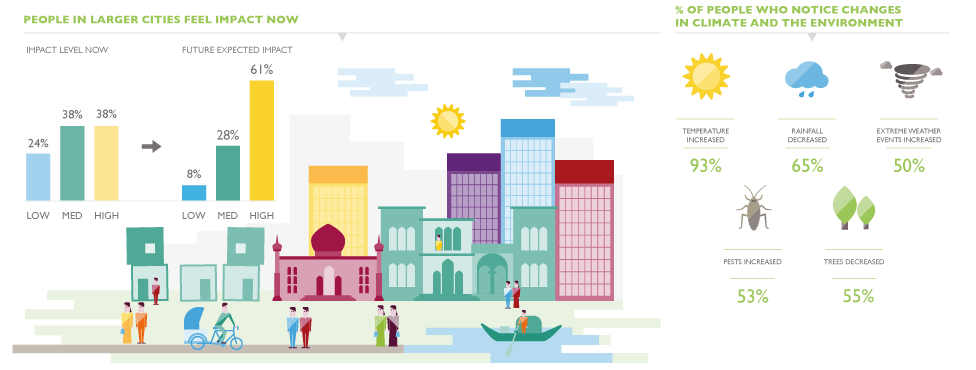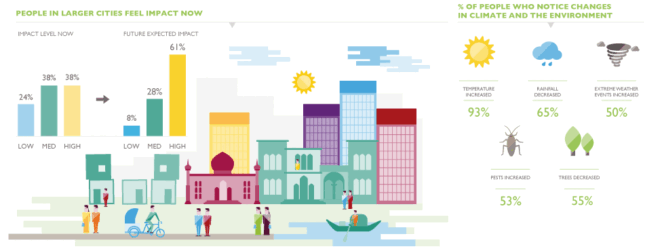Perceptions of Climate Change in Bangladesh

The Climate Asia project
Climate Asia is the largest ever study of people’s experience of climate change in seven countries – Bangladesh, China, India, Indonesia, Nepal, Pakistan and Vietnam – involving the collection and analysis of survey data from over 33,500 people. This unique data provides information for governments, donors, the media, NGOs and everyone who wants to support people to adapt to the changing environment.
Country Infographic

Context
Bangladesh is one of the countries most vulnerable to the effects of climate change and has a history of cyclones and floods.
People are experiencing higher temperatures, lower rainfall and less predictable weather compared with 10 years ago. These changes are having an impact on livelihoods and health. At the same time, only 25% feel prepared for extreme weather events.
People feel that the effects of these changes are being exacerbated by human activity such as population growth and the use of fertilisers.
Bangladeshis in Dhaka, where over a third of residents have arrived in the last five years, are finding life tougher than those in small cities who have access to more resources and facilities. They are struggling with water shortages, hot temperatures and an increase in health problems.
People feel that they need to take responsibility and adapt to these changes. Many have made changes to their livelihoods – migrating, supplementing their income in different ways or growing different crops.
Extensive media discussion and NGO intervention has led to a high level of awareness and knowledge of the term climate change.
Communication
People in Bangladesh are aware of changes and are already starting to act, yet this action needs to be encouraged and built on. Many people do not feel informed about how to respond, showing the need for information that is relevant to people’s situations. This could include, for instance saving water in larger cities and growing new crops in rural areas.
People also want to develop skills to help them diversify, such as being trained in new farming techniques or starting alternative businesses.
Communication should build on people’s sense of responsibility to take action. It can also make use of the strong community engagement and co-operation in Bangladesh by encouraging discussion to raise awareness, build networks between people to share information, and showcase examples of good practice to inspire people to act.
TV and mobile phones are used regularly by the majority of people, making these good channels of communication. However, face-to-face communication remains very important to people.
Being respected and fitting in with community are also highly valued. Older, educated men who have influence in communities are therefore a particularly good channel for communication as they have higher levels of knowledge around climate change, are acting more, discuss it more frequently than most and were eager to increase awareness within their community.
Findings
95% of people talk to friends or family for advice or information on water, food and energy issues and extreme weather events.
80%of people had watched TV within the last two days and 94% of people get information on water, food and energy issues and extreme weather events from the TV.
86% had used a mobile within the last two days.
81%of people feel their neighbourhood solves problems collectively.
86% of people cited needing government support as a barrier to responding.
45% did not feel informed about how to respond.
36% have made changes to their livelihoods as a result of changes in climate.
(0) Comments
There is no content